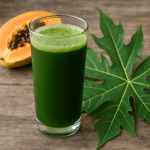The health benefits of blueberries come from their nutrient richness and high levels of antioxidants. They are low in calories and high in nutrients, making them a ‘superfood‘. But are they good for you?
Blueberry is the common name for flowering plants in the genus Vaccinium, a member of the Ericaceae family. They are the small blue or purple fruits that grow on this plant. They are juicy and slightly sweet. And yet it’s the name that stuck for both the berry and the plant.
The berry can range in colour from blue to purple. They’re a type of perennial flowering plant native to North America that was first cultivated in the early 1900s. There are many different types of blueberry, but highbush and lowbush are the most common.
Blueberries are a healthy snack and a great addition to most diets. As well as being nutrient-dense, they are also low in calories. They’re rich in essential nutrients such as vitamins C and K, and minerals such as manganese. It are also high in fibre.

Many people love blueberries because they’re delicious and convenient. Because of their versatility, they can be used to top waffles, pancakes, yoghurt, oatmeal, cereal, smoothies and muffins. Want to know how blueberries can benefit you? Come along as we explore the potential and benefits of blueberries.
What are the health benefits of blueberries? What happens if I eat blueberries everyday?
1. Blueberries may lower blood pressure
Keeping sodium intake low is an important part of blood pressure management. And it just so happens that they contain no sodium at all. Eating blueberries also helps lower blood pressure in people with metabolic syndrome by increasing nitric oxide production, which relaxes blood vessels.
2. Blueberries may help control cholesterol levels
Blueberries are rich in soluble fibre. The bile in our digestive system can be removed with the help of soluble fibre, which binds to it. Removing bile is important because it contains a number of harmful substances such as cholesterol, bile acids, salts, metals and bilirubin (a by-product of the breakdown of red blood cells).
3. Blueberries may protect the heart
Blood pressure and oxidised LDL cholesterol are risk factors, not diseases, and blueberry consumption has been shown to reduce both. Blueberries are great for your heart because they have no cholesterol. Fibre can also help lower blood cholesterol levels, which in turn reduces the risk of heart disease.
They are rich in phytonutrients, antioxidants, dietary fibre, potassium, folate, vitamins C and B6, and vitamin B6. Both vitamin B6 and folate can help prevent the build-up of a chemical called homocysteine. If homocysteine levels get too high, it can damage blood vessels and eventually cause heart problems.
4. Blueberries may help keep blood sugar under control
Blueberries are moderately sweet. One cup of blueberries (148 grams) contains 15 grams of sugar, which is about the same as a small apple or medium-sized orange. Compared to other fruits, they have less sugar and more fibre, so they won’t raise your blood sugar.
Blueberries’ anthocyanins boost insulin sensitivity and sugar metabolism. Improved insulin sensitivity has been linked to a reduced incidence of metabolic syndrome and type 2 diabetes, two conditions associated with many adverse health effects.
5. Blueberries can improve brain function
Due to their antioxidant properties, they may reduce oxidative stress in the brain. Oxidative stress can accelerate the natural ageing process of your brain, which can have a detrimental effect on brain function.
They contain powerful antioxidants, including flavonoids and anthocyanins. The anthocyanins in blueberries not only keep neurons healthy, but also improve their connectivity, making them more responsive. So it’s good for your memory and your brain.
6. Blueberries may be good for muscle strength
Muscle soreness and fatigue are common side effects of vigorous exercise. Oxidative stress and inflammation in your muscles contribute to this. Soreness and loss of performance could be reduced by taking a blueberry supplement, which may also help repair the damage at a molecular level.
Muscle fibres need rest, proper nutrition and time to recover in order to grow stronger. And one of the many benefits of eating blueberries is that they help repair muscle tissue more quickly.
7. Blueberries may be effective against urinary tract infections
Moisture in the urinary tract is a common way for bacteria to enter the body. Many people believe that cranberry juice can help prevent this type of infection. Because of their close relationship to cranberries, blueberries also contain many of the same active compounds found in cranberry juice.
The compounds in blueberries known as “anti-adhesives” prevent germs such as E. coli from settling on the membranes of your bladder.
With so many health benefits, there is no downside to eating blueberries every day. But raw, organic berries provide the most health benefits. Antioxidants are sensitive to high temperatures.
You won’t lose any of the beneficial vitamins and minerals, and the fibre will remain intact. However, antioxidants can be damaged by heat. This is why raw, fresh and organic blueberries are best.
Even if they’re not in season, they should be part of your daily diet. You can eat them all year round by freezing fresh blueberries or buying frozen bags with nothing added. Blend them into smoothies or thaw them in the fridge to sprinkle on everything from breakfast to garden salads.
They are generally a good dietary option, but there are a few things to keep in mind before eating them. If the immune system reacts to a protein with hives, swelling and other symptoms, then it means the body is allergic to that protein.
It’s not unusual to have an allergic reaction to certain foods. Overdosing can cause just as many problems as allergies. Remember, too much of anything is bad.
Disclaimer: The following information is provided solely for informational purposes and should not be considered professional advice or a substitute for professional consultation. While every effort has been made to ensure the accuracy and reliability of the information presented, we make no representations or warranties of any kind, express or implied, regarding the completeness, accuracy, reliability, suitability, or availability of the information provided. Any reliance you place on such details is strictly at your own risk.
Source: Healthline
You can also visit our Facebook and YouTube pages to know more about plants and their health benefits.
You might also like:








